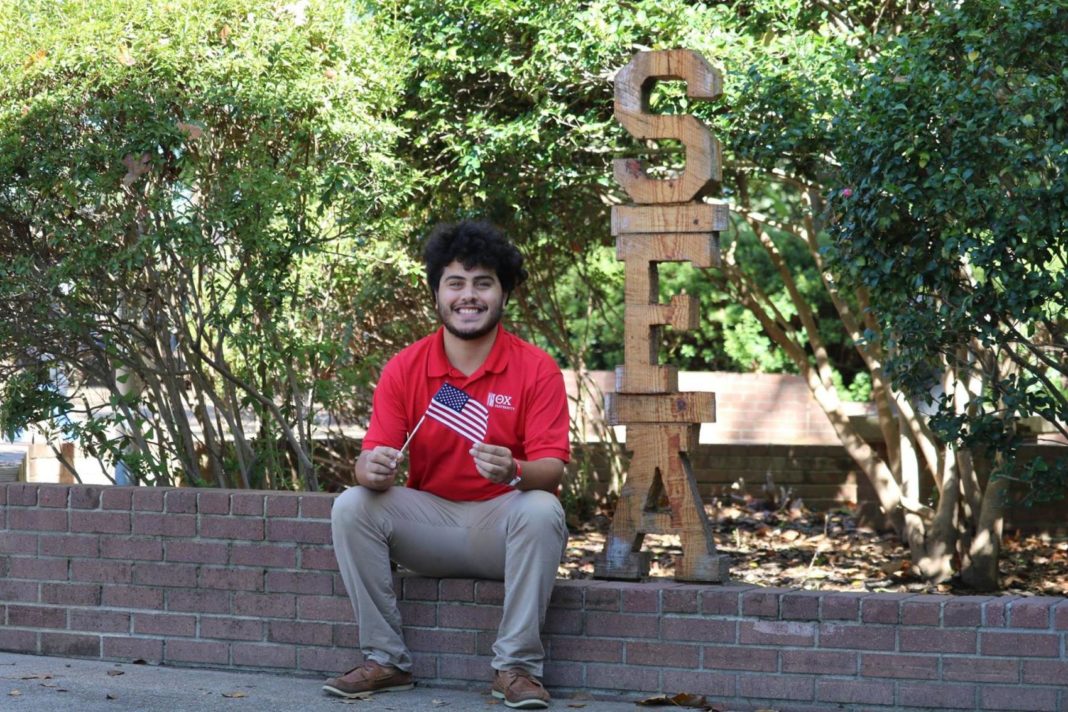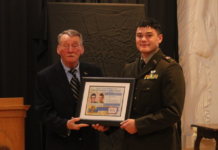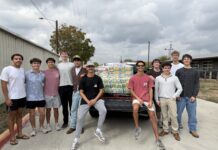Victor Torres is a junior vocal music education major at Stephen F. Austin State University. He is a part of the Order of Omega, Texas Choral Directors Association, A Capella choir, College Democrats, Jack Camp and the president of SFA’s chapter of Theta Chi. Torres has a busy schedule with a lot on his mind, but as of Oct. 17, there’s one less thing for him to worry about—his citizenship.
After 17 years of living in the United States, Torres and his family are now naturalized citizens. “It was like the biggest weight had been taken off my shoulders. I feel like I’ve been walking on air,” Torres said.
Torres’ parents and two older siblings moved to the United States from Hermosillo, Sonora Mexico when he was 3 years old under a work visa. They then began the process to achieve permanent residency, which Torres explained took several years and multiple attempts. Torres’ family was approved for their green cards the summer before his sophomore year of high school. However, their end goal was citizenship, which would require them to wait five years after becoming permanent residents and then another lengthy application process.
Torres and his family were able to take their citizenship exam in 2018. He said his dad took the exam before the rest of his family to let them know how it would go.
“They’re [the examiners] super nice. They know what’s going on, and they try to help us relax, but it still doesn’t help,” Torres said. “It doesn’t take away that there was still 17 years weighing on every single one of my answers.”
The exam had 100 questions that reconfirmed all his information verbally, demonstrated his English skills and included a portion on United States history. As the test went on, he could see if he had the correct answers and knew he passed in the end.
“I kept my composure and all that, and I left and went to the car and then I immediately started crying. It was such a huge relief that after so long I was finally on my way to being done,” Torres said.
He later took his oath and officially became a citizen. Torres explained how the best thing about becoming a citizen is the security and officially being a part of the American culture. He can relax now.
“It’s like I never wanted everyone to know what was going on because it really is scary…”
“It always was on the back of my mind,” Torres said. “It’s like I never wanted everyone to know what was going on because it really is scary, because literally someone else’s decision determined my entire life, so that’s something I couldn’t always risk. But it’s also not something I wanted everyone else to know.”
Reflecting on his personal experiences, Torres said that immigration offices were underfunded and understaffed, leading to a lot of time being lost between hearing back about important decisions being made on an individual’s case.
“We are trying to find the best opportunities for those we care about, and it’s completely justified to say there should be qualifications, that there should be requirements to be able to fully get all the privileges of being American, but it definitely should be reviewed because I definitely believe it’s outdated,” Torres said.
When asked what it was like to be citizen, Torres took a long pause and explained how much it meant to him to be able to be a part of the American culture. Even if people didn’t know he wasn’t a citizen before, he felt a separation.
“This has been my home for 17 years, and for someone else to say it’s not all the time… to say it doesn’t matter if you build your entire life here everything you know—your language, family, culture, friends, significant others and everything you’ve built here—for someone else to just repeatedly say it’s not actually your home… You’re trying to make it your home. It’d be nice to make it your home, but it’s not yet,” Torres said.
Saville Harris, assistant director of student engagement and Greek life and a Jack Camp director, got to know Torres as one of the Jack Camp counselors.
“Just being able to know that a student can come to college and have that weight taken off his shoulders to actually become a citizen, which is something that probably has always been a pain for him to be worried about being pulled over or being worried one day he could be taken away before fulfilling one of his dreams of getting his college degree,” Harris said. “I think it’s awesome. I gave him a hug and a high five just because I know that was a big weight, not only for his family but also for him.”
“After seventeen excruciatingly long years, I am finally a United States Citizen.”
After becoming a citizen, Torres posted to Twitter saying, “After seventeen excruciatingly long years, I am finally a United States Citizen.” The tweet has about 2,000 likes and 268 retweets.
“Even people I was friends with in elementary school, that I had kept up with, they were messaging me to tell me they were so happy for me,” Torres said. “It was really comforting and really, really nice to have that. It reinforced the idea that the inclusion and security that I had been searching for for 17 years… it made me realize that in that time I had built it, and now it’s just official and I’m able to enjoy it.”























